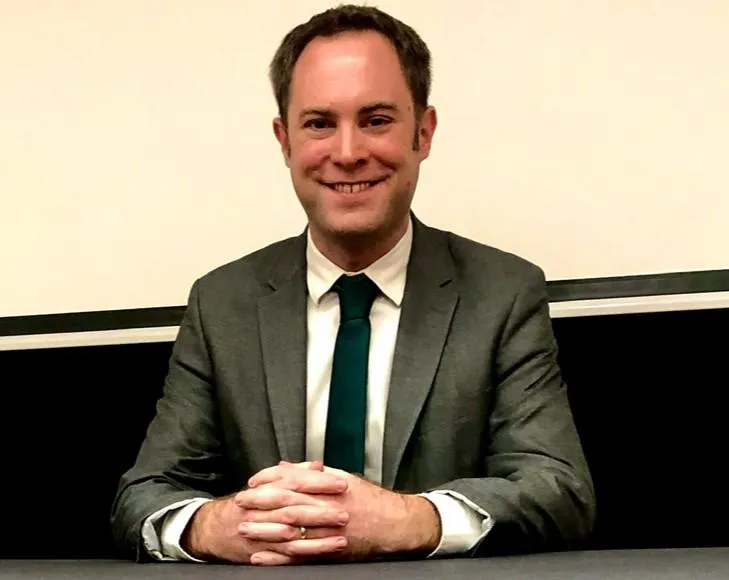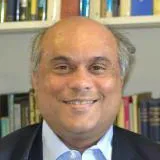17 May 2024
King's alum reflects on 'enjoyable journey' after passing PhD
To mark the completion of his doctoral studies, we caught up with Andrew Harrison to hear more about his research, his findings and his plans for the future.

Andrew, who studied with the Department of Political Economy at King’s, successfully defended his thesis following a rigorous examination from a panel of academics (known as a viva voce), in April.
The title of his thesis was ‘Preventative diplomacy: Britain, Yugoslavia, and the Cold War in Europe, 1968-1980’ and he was supervised by Dr Michael Kandiah and the late Professor Keith Hamilton.

Tell us what your doctoral research was about and why you chose that subject?
My doctoral research explored the development of British policy towards Yugoslavia from 1968 until 1980. In a way it was an extension of the research for my master’s degree where I wrote about Tito’s first visit to Britain in March 1953, which in term stemmed from an interest in how smaller countries could play a role in influencing wider diplomacy between the superpower-dominated Cold War blocs. I wanted to explore how and why Britain’s approach to Yugoslavia changed so rapidly after the Czechoslovak crisis in 1968, from a relationship of minor importance to actively pursuing and securing a state visit to Yugoslavia for Queen Elizabeth II in 1972, and eventually sending one of the most high-powered cross-party delegations to Tito’s funeral in 1980. Much has been written on Churchill’s decision to support Tito’s partisans during the Second World War and on Western attitudes to Yugoslavia’s bloody collapse in the 1990s, yet the scarcity of an in depth scholarly study of British relations with Belgrade during the 1970s offered an opportunity for me to add something new to the historiography.
Tell us also what, broadly speaking, the conclusions of your research were and what they might mean for the future?
I argue that, by the time of Tito’s death, Britain had a distinct policy towards Yugoslavia within the broader Western objective of keeping the Soviet Union out of the Mediterranean. Despite a period of superpower détente, Moscow’s pronouncement of the Brezhnev doctrine combined with increasing chaos and uncertainty in the region - illustrated by the fall of dictatorships in Greece, Spain, and Portugal, conflict between NATO allies Greece and Turkey over Cyprus, the awkward Dom Mintoff taking power in Malta, and a growing concern about the electoral successes of ‘Eurocommunist’ parties in Italy and France - meant maintaining the regional status quo and protecting Yugoslav non-alignment and independence became increasingly important to decision-makers in London. I reject the hypothesis that British leaders were in any way ‘hoodwinked’ into lending their support to Tito, with the deliberate use of senior royals, enthusiastic engagement in arms sales and military training, and the propagation of perceived shared experiences during the Second World War emerging as key pillars in in a policy of ‘preventative diplomacy’ to dissuade Moscow from any overt or covert action against Yugoslavia.
Tell us about the research methods you used and the sort of data you were using…
Much of the material analysed came from government papers from various departments held at The National Archives in Kew, where I also work as the senior media officer. My research is a study of the development of British policy and so it explores how officials at the prime minister’s office, Cabinet Office, Foreign and Commonwealth Office, Treasury, Ministry of Defence, and the embassy in Belgrade, worked to establish and finetune a collective approach towards Yugoslavia. I also made use of the British Diplomatic Oral History Programme resources at Churchill College, Cambridge, contemporary newspaper and television news reports, and published primary sources such as the memoirs of the leading personalities involved.
How does it feel to have passed? What are your plans for the future?
It has been a long but enjoyable journey as I completed this study on a part-time basis while also working full-time. My life has changed dramatically since I started having got married, become a father, and lost loved ones, especially my stepdad and grandfather who took an active interest in my research. I am now exploring publishing options in the form of journal articles and a monograph in order to build on areas of my research, while also running around after an energetic two-year-old!
Is there anybody you’d like to thank or acknowledge?
The support of my family and friends over the years has been vital, especially that of my wife Dr Maggie Scull. I am of course indebted to my supervisors, Dr Michael Kandiah and the late Prof Keith Hamilton, at the Department of Political Economy at King’s. It was a profound shock to learn of Keith’s passing in the days after our last e-mail exchange when I sent him the final draft of my thesis. He was such a generous man when it came to giving his time, advice, and giving thoughtful suggestions. I know he is greatly missed by all who knew him and it was a privilege to have him as a supervisor.

